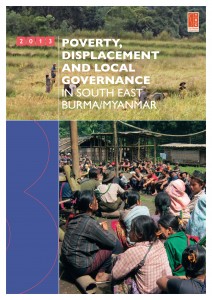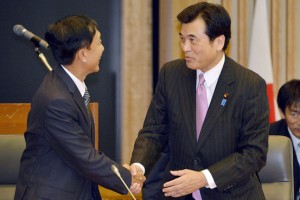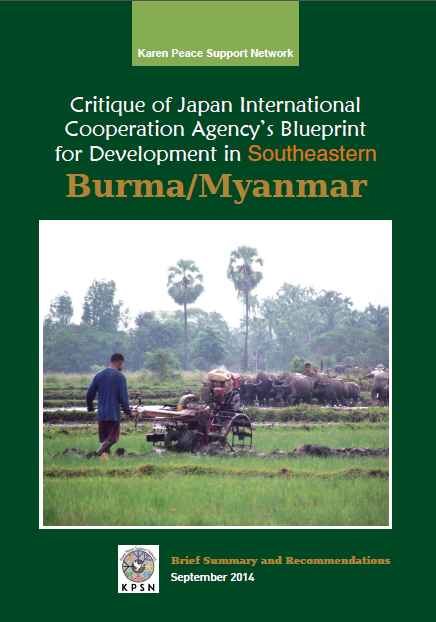Posts Tagged ‘Development’ (14 found)
Joint Submission on the Proposed World Bank Group’s Country Partnership Framework (CPF) in Myanmar
We, the undersigned organizations in Myanmar and other countries, respectfully submit these comments to the World Bank Group to inform the development of the Country Partnership Framework for Myanmar. We belong to civil society organizations and ethnic community networks with a focus on human rights, environment, peace and mediation, and good governance with significant expertise and experience in Myanmar […]
• • •Critique of Japan International Cooperation Agency’s Blueprint for Development in Southeastern Burma/Myanmar
The Japan International Cooperation Agency (JICA) has recently issued a blueprint that proposes industrial development in Southeast Burma/Myanmar, purportedly to aid in the return and settlement of refugees and Internally Displaced Persons (IDPs) in Karen and Mon States. However, the Karen Peace Support Network (KPSN), a network of nearly 30 ethnic Karen organizations, cautions JICA that its blueprint for infrastructure development such as roads and industrial estates in the war-torn southeast is premature and flawed, potentially exacerbating conflict in the region.
The KPSN (formerly KCBPSN) is the largest network of Karen civil society organizations in Burma/Myanmar. These organizations have been providing support for vulnerable people in this conflict-torn region for decades, striving to empower local communities, build transparent and accountable institutions, and help create a sustainable peace in Burma/Myanmar. KPSN and its member organizations are important stakeholders which must be included in any development planning process in the Karen areas of the southeast […]
• • •New Report: Japan – Burma Plan Could Fuel Conflict in Ethnic Areas
Japan’s new development plans for Southeast Burma could fuel conflict rather than promote peace, warns the largest network of ethnic Karen organizations in the country in a report it will release today in Yangon.
The Karen Peace Support Network (KPSN) launches its report today – Critique of Japan International Cooperation Agency’s Blueprint for Development in South-Eastern Burma/Myanmar – at the Myanmar Journalist Network (MJN) office in Yangon […]
• • •Poverty, Displacement and Local Governance in South East Burma/Myanmar
 As the pace of reform has slowed in Burma/Myanmar during 2013, the potential for an inclusive political dialogue process to address the causes of conflict has increased. The sustainability of national reconciliation will require sensitivity to the concerns and aspirations of ethnic nationality communities in relation to identity, security and justice. This village-level survey describes the challenge of addressing chronic poverty, protracted displacement and weak governance at the community level in South East Myanmar as part of the conflict transformation process […]
As the pace of reform has slowed in Burma/Myanmar during 2013, the potential for an inclusive political dialogue process to address the causes of conflict has increased. The sustainability of national reconciliation will require sensitivity to the concerns and aspirations of ethnic nationality communities in relation to identity, security and justice. This village-level survey describes the challenge of addressing chronic poverty, protracted displacement and weak governance at the community level in South East Myanmar as part of the conflict transformation process […]
Myanmar Peace Process Must Address Protection Concerns: NGO Report
Village Survey in Myanmar identifies challenges for poverty alleviation, displaced persons and local governance
The Border Consortium (TBC), an NGO that works with the displaced and conflict-affected people of Myanmar, today released findings from its annual survey which describe chronic poverty, protracted displacement and weak governance as the starting point for conflict transformation. Eleven civil society organisations in South East Myanmar collaborated with TBC to conduct the survey in 209 villages spread across 6 states and regions […]
• • •Council Conclusions on the Comprehensive Framework for the European Union’s Policy and Support to Myanmar/Burma
The Council adopted the following conclusions:
“The Council welcomes and endorses the attached Comprehensive Framework consisting of priorities for the European Union’s policy and support in the next three years to the on-going reforms in Myanmar/Burma. This Framework sets forth EU’s goals and priorities geared towards building a lasting partnership and promoting closer engagement with the country as a whole […]
• • •Statement No. (2/2013) of the Myanmar National Human Rights Commission Regarding the Conflict in Kachin State
The Myanmar National Human rights Commission is gratified that the Union Peace-Making Committee and the KIO delegation were able to issue a joint statement at the peace talks held at Shweli (Ruili) of the People’s Republic of China on 11-12 March 2013 and that positive developments were achieved. The Myanmar National Human Rights Commission also whole-heartedly welcomes the statement that the Union Government will accelerate development and rehabilitation tasks in the Kachin State as the process to achieve cease-fire has commenced under said joint statement […]
• • •New Survey: Communities Across Burma Denied Voice in Mega-Projects
The Students and Youth Congress of Burma (SYCB) and Nationalities Youth Forum (NY-Forum) have released a new report entitled “Excluded: Burma’s Ethnic Nationalities on the Margins of Democracy and Development.” The report documents evidence that ethnic nationalities directly affected by development projects in Burma are systematically denied their right to free, prior, and informed consent (FPIC), and are forced to bear the brunt of these projects […]
• • •Ending 50 Years of Military Rule? Prospects for Peace, Democracy and Development in Burma
The thaw in the repressive climate of Burma was epitomised by by-elections held in April 2012 in which the opposition National League for Democracy, led by Aung San Suu Kyi, scored a resounding victory. President Thein Sein’s government has also reached initial peace agreements with most armed groups. But the challenges faced by a reformed Burmese state remain vast, while serious doubts remain as to the real commitment of military and business leaders to a thoroughgoing process of democratisation and accountability […]
• • •New Lending Must Address Challenges on Burma’s Road to Development
 On 11 October, Japan announced that it would be resuming loans to Burma. It also hinted that it will assist the heavily indebted country in clearing its arrears and establishing good financial standing with international financial institutions, such as the World Bank and the Asian Development Bank.
On 11 October, Japan announced that it would be resuming loans to Burma. It also hinted that it will assist the heavily indebted country in clearing its arrears and establishing good financial standing with international financial institutions, such as the World Bank and the Asian Development Bank.
Japan will be forgiving US$3.7 billion or about 60% of the total $6 billion debt Burma owes; it is also planning to use bridge loans by Japanese banks to help clear Burma’s $900 million of arrears with the World Bank and the Asian Development Bank. Japanese Finance Minister Koriki Jojima stated, “Japan is planning to resume its full program in Myanmar with yen loans to help support Myanmar’s sustainable economic development…at the earliest possible timing next year.” He further explained that Japan’s development priorities in Burma would focus specifically in the areas of electricity and road rehabilitation, rural development and improvement of port facilities.
At this moment in time, Burma’s re-entry into the world economy, specifically the ability to take loans from institutions such as the World Bank, the Asian Development Bank and Japan itself, carries great risk. The type of projects to be funded, the rate of investment, the sectors in which investment will take place, the presence of monitoring mechanisms, and the decision-making process are just some of the factors that will determine the long-term outcome of international financial support […]










 All posts
All posts